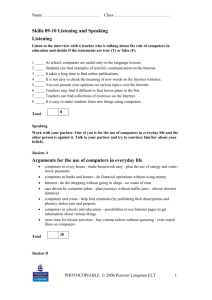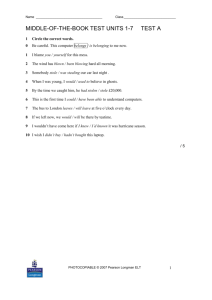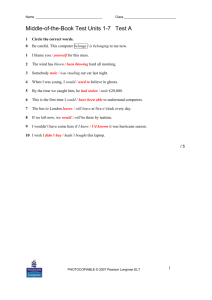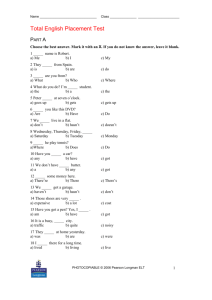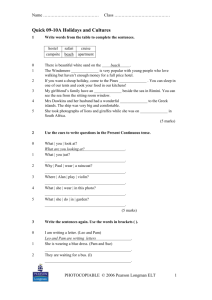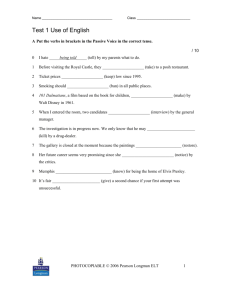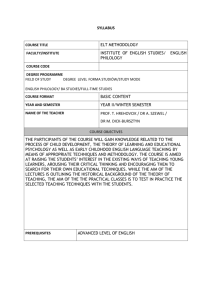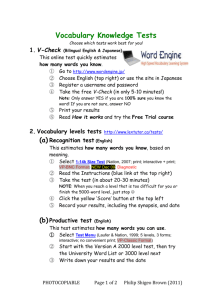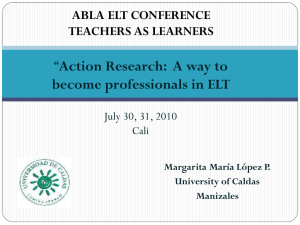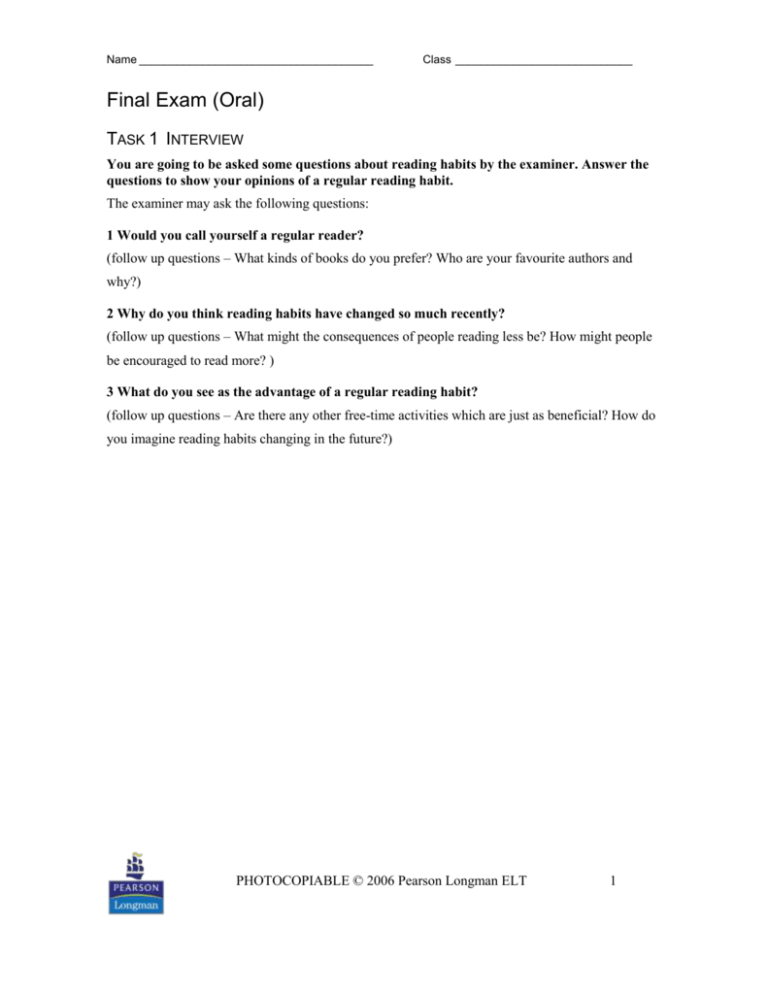
Name _____________________________________
Class ____________________________
Final Exam (Oral)
TASK 1 INTERVIEW
You are going to be asked some questions about reading habits by the examiner. Answer the
questions to show your opinions of a regular reading habit.
The examiner may ask the following questions:
1 Would you call yourself a regular reader?
(follow up questions – What kinds of books do you prefer? Who are your favourite authors and
why?)
2 Why do you think reading habits have changed so much recently?
(follow up questions – What might the consequences of people reading less be? How might people
be encouraged to read more? )
3 What do you see as the advantage of a regular reading habit?
(follow up questions – Are there any other free-time activities which are just as beneficial? How do
you imagine reading habits changing in the future?)
PHOTOCOPIABLE © 2006 Pearson Longman ELT
1
TASK 2 DEBATE
The national register of households is over – but is it going to tell us anything important about our
society? According to the latest data, only 60% of families actually chose to respond to the
questionnaires. Even more alarmingly, some ethnic groups have apparently not been reached by the
questionnaires at all, which raises the question whether ...
Debate Task
You will have a conversation with your examiner. Discuss the positive and negative
consequences of surveys and public opinion polls. Your examiner will sometimes contradict
you. Try to react to your examiner’s counter-arguments. You have 30 seconds to think over
your points.
PHOTOCOPIABLE © 2006 Pearson Longman ELT
2
Here are some arguments you may wish to
include:
For
Against
Surveys and opinion polls show the thoughts
and feelings of the people. They are a basic
tool of democracy.
Polls and surveys help governments to plan
for the future.
Any survey or poll can be manipulated.
People need to be aware of how other’s
think about an issue in order to decide their
own opinions.
As surveys and polls are based on
‘representative’ samples, the results are not
always true for the whole population.
The minority has a say but the majority has
a way.
There are three kinds of lies: lies, damned
lies, and statistics.
Surveys and polls are mainly used to
convince people that what politicians and
marketing executives say is true.
TASK 3 PRESENTATION AND DISCUSSION TASK
The keys to academic success for disadvantaged children may not be smaller class sizes, betterprepared teachers, tougher standards, or greater choice. There may instead be a simple solution:
start school early!
The magazine extract suggests that starting school at an early age is very beneficial. Give a
few examples of why you think an early start to education might be useful and outline any
drawbacks. When you have finished the examiner will ask you some questions.
PHOTOCOPIABLE © 2006 Pearson Longman ELT
3
Final Exam (Written)
LISTENING COMPREHENSION
TASK 1
Track 12
You will hear six people talking about protecting the environment. Match each person with
one of the opinions (A–G). There is one extra opinion. Put the correct letter in the boxes 1.1–
1.6. You will hear the text twice.
A People get rid of their belongings too easily and this means a lot of unnecessary damage to the
environment.
B Reusing things is more important for environmental protection than insulating your home.
C Living a healthy lifestyle may not be that cheap but it’s good for you.
D Local authorities should spend more to help people save the environment.
E
People would do more for the environment if they were given more help with what to do, and
how.
F
Litter produced by visitors to the area is always left for the local residents to deal with.
G People should use public transport and get rid of private vehicles.
1.1
1.2
1.3
1.4
1.5
1.6
PHOTOCOPIABLE © 2006 Pearson Longman ELT
4
TASK 2
Track 13
Read the sentences 2.1–2.5. You will hear an extract from a lecture about the British sitcom
yesterday and today. Decide which of these statements are true, which are false and which are
not stated in the text. An example (2.0) has been done for you. Tick an appropriate box in the
table. You will hear the text twice.
TRUE
2.0
Ann Campbell has written many books about comedy.
2.1
In the 1960s, sitcom writers in Britain would spend half
FALSE
NOT STATED
✓
a year writing on average one script per month.
2.2
The early sitcoms were produced in a very creative
way.
2.3
The sitcom viewers in the studio tended to be middle
class and brought from other parts of the country.
2.4
By the 1990s, the British sitcom began to appear
artificial because it didn’t resemble contemporary films.
2.5
The lecturer’s main point is that the new types of
sitcom have made a clean break from the comic
traditions of the past.
TASK 3
Track 14
Read the sentences 3.1–3.4. You will hear four radio news extracts. Decide which answer (a, b,
c or d) best fits the text and circle it. You will hear the text twice.
3.1 Which problem with iPods is NOT mentioned in the text?
a) Their screens get scratched too easily.
b) Their earphones don’t work.
c) Their manuals fail to give important information.
d) Their noise safety levels are wrongly calculated.
PHOTOCOPIABLE © 2006 Pearson Longman ELT
5
3.2 Which statement about the play The Exonerated is true?
a) It consists of forty emotional interviews.
b) It is about people who faced capital punishment.
c) It considers pros and cons of imprisonment.
d) It was first shown in New York nine years ago.
3.3 In contrast to Norfolk, police in Essex
a) have got more moonlighting officers.
b) are much more numerous and busy.
c) are given a wider range of career options.
d) have got the full support of the Home Secretary.
3.4 The new set of stamps will be special because
a) it will bring to an end a longer project.
b) it will include images of England, Ireland and Wales.
c) it will have ten more images than the set about Scotland.
d) it will present ten different winter landscapes.
PHOTOCOPIABLE © 2006 Pearson Longman ELT
6
Final Exam (Reading Comprehension)
TASK 4
Read the article. In Part 1 of the task, match each part of the text with one of the titles (A–F).
There are two extra titles you do not need. Put the correct letters in the boxes (4.1–4.4). In
Part 2, decide which sentence (a, b, c or d) best summarises the text.
We are moving ever closer to the era of mind control
Brain scientists are on a roll. Concern about rising levels of mental distress have resulted in
unprecedented levels of funding in the US and Europe. And a range of new technologies, from
genetics to brain imaging, are offering extraordinary insights into the molecular and cellular
processes underlying how we see, how we remember and why we become emotional.
4.1
Brain imaging has become familiar. Scanners, known by their initials – CAT, PET, MRI – began as
clinical tools, enabling surgeons to identify potential tumours, the damage following a stroke or the
diagnostic signs of incipient dementia. But neuroscientists quickly seized on their wider potential.
Images of regions of the brain ‘lighting up’ when a person is thinking of their lover, imagining
travelling from home to the shops or solving a mathematical problem, have captured the
imagination of researchers and public alike. What if they could do more?
4.2
Recently, I published the results of an experiment in which we looked at the regions of the brain
that became active when people choose between competing products in supermarkets. Major
companies, ranging from Coca-Cola to BMW are starting to image the brains of potential customers
to study how they respond to new designs or brands. They are beginning to speak of
‘neuromarketing’ and ‘neuroeconomics’.
4.3
Such trends may be relatively innocent, but the increasing State interest in what the images might
reveal is less so. Specifically, what if brain imaging could predict future behaviour, or indicate guilt
or innocence of a crime? There are claims, for example, that it could reveal potential ‘psychopathology’, that the brains of men convicted of brutal murders show significantly abnormal patterns.
4.4
PHOTOCOPIABLE © 2006 Pearson Longman ELT
7
In the current legislative climate, where there have been attempts to introduce pre-emptive detention
for ‘psychopaths’ who have not yet been convicted of any crime, such claims need to be addressed
critically. The claims will be resisted by the judiciary, but recent developments suggest that this
may be a frail defence against an increasingly authoritarian state. Even more seriously, there is also
increasing interest in the development of techniques that can survey and possibly manipulate the
mental processes of potential state enemies, or enhance the mental potential of one’s own troops.
4.5
Science cannot exist without major public and private expenditure but its goals should be set at least
as much by the market and the military as by the disinterested pursuit of knowledge. This is why
neuroscientists have a responsibility to make their subject and its potential as transparent as
possible, and why the voices of concerned citizens should be heard not ‘downstream’ when the
technologies are already fully formed, but ‘upstream’ while the science is still in progress. We have
to find ways of ensuring that these concerned voices are listened to through the cacophony of
slogans about ‘better brains’ – and the power of the military and the market.
Part 1
A A method of preventing wrongdoing from happening
B A diagnostic device with a special appeal
C A scientific technique with many practical applications
D A way of finding out about market preferences
E
A strategy for improving the country’s legal system
F
A weapon of governmental and military control
Part 2
Which sentence best summarises the author’s conclusion?
a) The financial involvement of the market in the development of brain-scanning should be kept
down to a minimum.
b) Scientific progress in brain-scanning must not happen without taking into consideration the
public opinion.
PHOTOCOPIABLE © 2006 Pearson Longman ELT
8
c) Scientists should develop reliable surveys that will gauge the public response to brain-scanning
more accurately.
d) Brain-scanning technologies may be hard to develop without the support of the economic and
political authorities.
TASK 5
Read the text, from which four sentences have been removed. Put sentences (A–F) into the
gaps (5.1–5.4) to create a coherent and logical text. There are two extra sentences that you do
not need.
Mockingbird author steps out of shadows
Harper Lee wrote the classic To Kill a Mockingbird, a book on racial injustice in the American
South, which has sold over 10 million copies. Yet the author herself disappeared from public life for
more than four decades. Now, as she has become a key character in the acclaimed film Capote, it is
time to remember some of the facts about her life and work.
Nelle Harper Lee was born in Monroeville in 1926, in the Deep South, at a time of strict racial
segregation. She moved to New York determined to become a writer. Her first brush with fame
came when she worked as assistant to Truman Capote while he was writing In Cold Blood, a
seminal novel exploring a multiple killing in Texas. The book, which took six years to write and
eventually created a new genre of crime writing, was dedicated to Lee. Capote, who had been a
childhood neighbour of Lee’s, credited her for doing ‘secretarial work’ on the project.
( 5.1 __________ ). These emerged as To Kill a Mockingbird which was published in 1960 to
massive, and by Lee at least, totally unexpected critical acclaim.
PHOTOCOPIABLE © 2006 Pearson Longman ELT
9
The book was an instant bestseller and won a Pulitzer Prize. (5.2 __________ ). ‘The book
occupies a revered place in the canon of great American literature, which its screen adaptation could
only enhance,’ said Professor Jeffrey Weinstock, an American literature expert at Central Michigan
University.
But the instant success terrified Lee. In one of her few detailed interviews, given in 1964 to
author Roy Newquist, she offered an insight into the impact of instant fame. (5.3 __________ ). ‘I
sort of hoped someone would like the book enough to give me encouragement. I hoped for a little
but I got rather a whole lot and in some ways this was just about as frightening as the quick,
merciful death I’d expected,’ she said.
But as Lee disappeared from public life, To Kill a Mockingbird became a revered chronicle of
the South, and has continued to be ever since. (5.4 __________ ). Lee never wrote another novel.
She contributed a handful of magazine articles and essays in the early 1960s and then almost
nothing else for the rest of her life. Some believe she simply had said everything she wanted to say
about the subject that mattered most to her: her childhood in the South.
A It is taught to nearly all American high school students and is the regular subject of lectures and
speeches.
B At the same time, it marks the degree to which Lee was disappointed with her work.
C It was all the more surprising and overwhelming for someone who had been seen as a sidekick
to the more glamorous Capote.
D But Lee had been working on her own stories inspired by the South and her childhood.
E
It was also made into the hit film starring Gregory Peck, which quickly became a classic.
F
To put it differently, Lee was involved in the job of gathering all the loose ends of her work into
one coherent whole.
PHOTOCOPIABLE © 2006 Pearson Longman ELT
10
TASK 6
Read the text. Fill in the gaps (6.1–6.6), choosing one of the options (a, b, c or d) to create a
logical and grammatically correct text.
‘I came out of the exam with a smile’
A six-year-old boy who was celebrating a GSCE in information and communication technology
said he wanted to grow up to be an inventor (6.1 __________ ) he could ‘touch clouds’. Armaan
Genomal, from St John’s Wood in north-west London, is (6.2 __________ ) to be the youngest
recipient of a GCSE in the country. He was (6.3 __________ ) a B grade.
Armaan was in a class of eight pupils aged just six and seven who took the exam after studying with
Ryde Teaching Services. He completed the course in just nine months; it (6.4 __________ ) takes
16-year-olds two years.
Armaan said ‘It was quite easy, actually. I came out of the exam with a smile.’ He said he (6.5
__________ ) the practical parts of the course to the theory. Armaan now plans to turn his (6.6
__________ ) to GCSE French. ‘Then every time I go to France I can speak their language.’ he
explained.
6.1.
6.3.
6.5.
a) but
a) just
a) studied
b) before
b) getting
b) preferred
c) so
c) after
c) selected
d) and
d) awarded
d) added
6.2.
6.4.
6.6.
a) said
a) rarely
a) ambition
b) surely
b) only
b) attention
c) used
c) normally
c) education
d) understood
d) especially
d) eyes
PHOTOCOPIABLE © 2006 Pearson Longman ELT
11
Final Exam (Writing and Lexical/Grammatical Structures)
TASK 7
Write a composition on one of the three topics below. Your composition should meet all the
formal requirements characteristic of the genre specified in the topic. The composition should
be between 200–250 words.
1
Write a review of a film that in your opinion is worth recommending to people who enjoy
comedies.
2
Describe a place in your country which is worth visiting by people of your age coming to your
country for the first time.
3
Should smoking be forbidden in all public places? Write a for and against essay in which you
present different aspects of this issue.
TASK 8
Read the text. Fill in the gaps (8.1–8.5), transforming the words in brackets to create a logical
and grammatically correct text.
In praise of ... domes
Today’s official (8.1) _______________ (open) of the campus of the University of Derby in
Buxton, which boasts a beautiful dome 150 feet in diameter, is a timely (8.2) _______________
(remind) of the affection in which these semi-spherical artefacts are held all over the world. Domes
are special. Whether this is down to the simple symmetry of their shape or because they generate
intimations of a universe above, can only be guessed at. But there is something (8.3)
_______________ (time) about them which may help explain why they are revered the world over.
Everyone has their own favourite. One of the best of these grand domes in Britain is St Paul’s
Cathedral, a (8.4) _______________ (monument) masterpiece with enough glass to light up the
interior and a 300 year-old whispering gallery which still produces excitement in children in the
Internet age. The more the world changes around it the more the dome becomes an icon of (8.5)
_______________ (stable).
PHOTOCOPIABLE © 2006 Pearson Longman ELT
12
TASK 9
Read the text. Fill in the gaps (9.1–9.5) with appropriate forms of the verbs in brackets to
create a logical and grammatically correct text.
Tony Parsons, the author of Man and Boy, talks about his plans for this week
I am packing for Shanghai. My next book is set there and I need to walk its streets, let the city and
the story seep into my bones. I (9.1.) _______________ (not be) to Shanghai for ten years, and
expect it (9.2.) _______________ (change) almost beyond recognition. A friend of mine from Hong
Kong, a doctor, has just opened a practice in Shanghai. He is going to lift the lid for me, but I know
that others (9.3.) _______________ (lift) it, too, and they are people I haven’t even met yet. I’m
excited – it feels like I (9.4.) _______________ (fly off) to witness a 21st-century gold rush.
(9.5.) _______________ (start) a new book is like jumping off a cliff. Once you truly commit, you
are stuck with your choice. The taxi comes. I jump.
PHOTOCOPIABLE © 2006 Pearson Longman ELT
13

